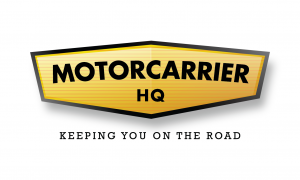May 4, 2022
What to Expect in Your First Year as an Owner-Operator

Being an owner-operator is a natural next step for many truck drivers who’ve been around the business for a while, or for anyone who simply loves the idea of owning their own rig. While switching roles to a full-time owner-operator does carry some risk and isn’t the type of decision a driver should make without first putting it some serious thought, the career move also includes the potential for huge personal and financial rewards.
Over the course of our team’s own “Haulin Assets” podcast, series host and owner of Motor Carrier HQ, Chris Vernon, documented the highs and lows of his first year as an owner-operator, including how he grew a one-man trucking company into a profitable small fleet. Chris’ successes, failures, and at least one instance of his truck getting hit by a deer create something of a blueprint that future drivers who are aiming to follow a similar path can reference and learn from.
Read on to learn more about some of the most important things Chris learned and what you can expect during that first year of being your own boss.
Make No Mistake, The First Year Can Be Challenging
Before potential owner-operators strike out on their own in search of greater autonomy, it’s worth acknowledging some obvious hurdles barring the road ahead.
Remember that first and foremost, owner-operators are small business owners. Owning a business is no easy task. Every day — especially during that first year — presents new challenges and situations that most truckers haven’t yet had to deal with on their own.
Three of the biggest obstacles for new owner-operators are:
- Expensive Upfront Costs
You probably shouldn’t take on the pressure of owner-operatorship without at least some capital built up to support your new business. Obtaining a truck, either through buying one outright or leasing one from another business, can be extremely expensive. And that’s before you factor in all of the other expenses that come along with vehicle ownership like fuel, insurance coverage, regular maintenance fees, and repair costs. All of these are regular expenses that are required just to keep the rig operating safely.
Additionally, upon acquiring a truck and any other necessary equipment to take on jobs, you’ll still need to pay all kinds of registration fees and other seemingly minor expenses that tend to add up if you’re not careful. With so many new responsibilities, it’s easy to overlook these extra costs and get wrapped up in paying for the truck alone. Don’t let the less obvious expenses for new owner-operators catch you unprepared.
To get a better idea of what expenses you should expect before taking on your first job, use our start-up cost calculator. This tool can help you estimate how much capital you’ll need in order to get your new business up and running.
- Readying for Compliance Audits
There is a surprising amount of paperwork required to legally ship goods from point A to point B. Having the right documentation on file at all times — including proof of physical, drug and alcohol testing, licenses, endorsements, and valid training certificates — is just part of the gig.
The sudden increase in paperwork can be overwhelming at first, so it’s important you develop a good filing system and track any expiration dates closely. You can stay organized with our DOT compliance checklist so your documentation is always up to date and your business prepared for any sudden audits. A failed audit can set new businesses back considerably as they try to build a healthy reputation.
- Finding Loads
After gathering all of the components needed to finally be able to return to life on the road, there’s still the matter of finding enough work to support yourself and the business you’ve just created from scratch.
This industry is built largely on networking and communication between shippers and carriers. As a new player on the board, you’ll likely have to do some grinding to establish your own network and earn the trust of those offering jobs in your region.
Building your reputation as a trustworthy owner-operator will take time, and it may require subscribing to a few load boards or networking through connections you’ve already made within the industry. While some businesses still prefer to work with bigger shipping partners who they’ve come to trust over the years they’ve worked together, many are excited by the opportunity to work with smaller trucking companies. Mom-and-pop operators have a reputation for taking better care of their cargo and customers in exchange for a newly-formed relationship with shippers.
Though they may be some of the biggest obstacles, they aren’t the only ones you’ll face during your first year as an owner operator. That’s why it’s important to do your research and, if possible, talk with other owner-operators about their experiences in starting their businesses.
Freedom, Profits, and Creating Your Own Business Can Mean It’s Still Worth It
Yes, getting the ball rolling as a new business owner can seem daunting at first. However, for most truckers, the advantages of being an owner-operator far outweigh the challenges. As an owner-operator, you have full control over your own business decisions. That means rates, jobs, routes, and the number of days spent on the road is yours to determine. Chris managed to generate over $200,000 in total revenue in his first 12 months as an owner-operator, despite minimal starting experience and a four-week stoppage for Army National Guard obligations.
There aren’t many industries where profit is only limited by the amount of work you’re willing to take on. The challenges of owning a business and dealing with shippers and receivers yourself are real, but so is the satisfaction of owning something that’s all yours. Nothing quite compares to the freedom of being able to take the jobs you want at the rates you want and fully enjoying the fruits of a job well done.
Getting Started Is Much Easier With the Right Resources
After thoroughly researching the pros and cons of owner-operatorship, you may decide that now isn’t the right time for you to launch your own business.
However, if you do decide to move forward or are even just thinking about it and want to know what the necessary steps are to become an owner-operator, you may want to check out some of our other articles on the subject. Chris’ year-in-review episode is a great place to start for a detailed picture of what goes on in the daily life of an owner-operator. You’ll also find essentials for obtaining your own operating authority, readying for a safety audit, and eight crucial resources we provide to help you get your company off the ground.




